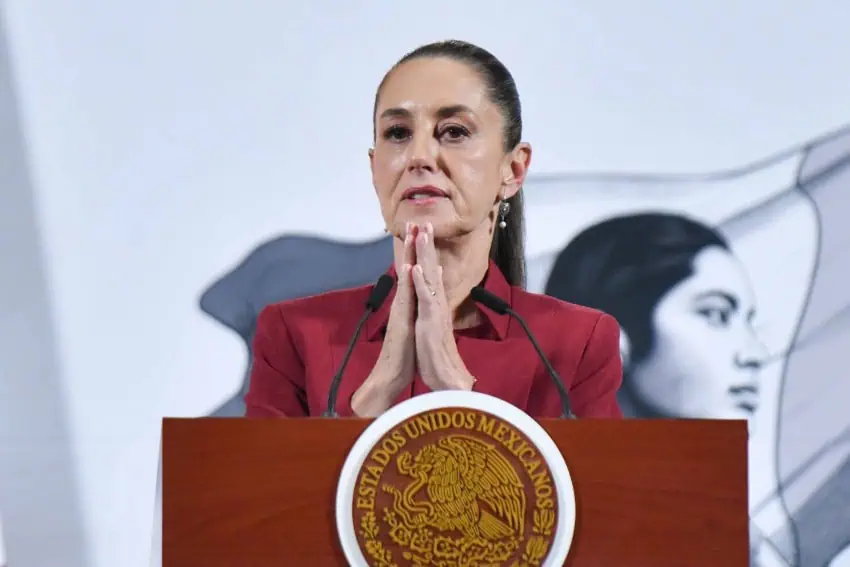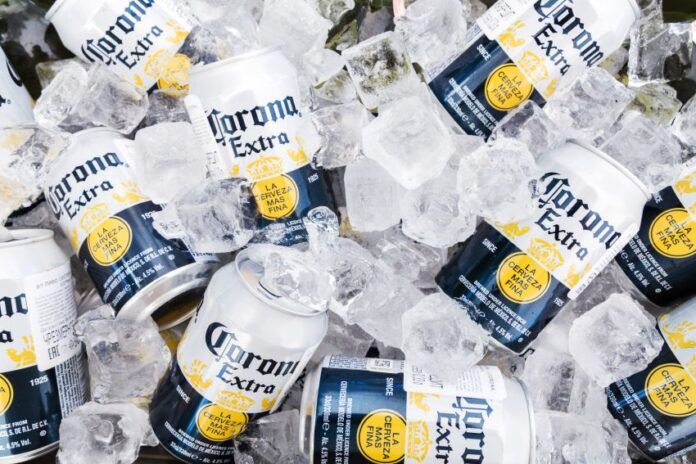United States President Donald Trump didn’t announce any “reciprocal tariffs” on imports from Mexico on Wednesday, but a 25% tariff on Mexican canned beer is set to take effect on Friday.
During a speech in the Rose Garden of the White House, Trump presented a chart outlining “reciprocal tariffs” on imports from a long list of countries, but Mexico wasn’t among them.
President Trump announces a minimum 10% tariff on all countries plus additional country-specific rates. pic.twitter.com/jM5272SSCm
— CSPAN (@cspan) April 2, 2025
In a fact sheet explaining the “reciprocal tariff” executive order the U.S. president signed on Wednesday, the White House said that Mexico and Canada are “unaffected by this order.”
“This means USMCA-compliant goods will continue to see a 0% tariff, non-USMCA compliant goods will see a 25% tariff, and non-USMCA-compliant energy and potash will see a 10% tariff,” the White House said.
“In the event the existing fentanyl/migration IEEPA [International Emergency Economic Powers Act] orders are terminated, USMCA-compliant goods would continue to receive preferential treatment, while non-USMCA-compliant goods would be subject to a 12% reciprocal tariff,” the fact sheet said.
On March 6, Trump announced that imports from Mexico covered by the USMCA free trade pact would not be subject to U.S. tariffs until at least early April. He had imposed a 25% tariff on all imports from Mexico and Canada two days earlier due to what the White House said was the two countries’ failure to take adequate action against “the influx of lethal drugs” to the U.S.
While the tariff-free trade of USMCA-compliant goods continues for now, 25% tariffs on Mexican steel and aluminum, and hundreds of products made with those metals, remain in effect. Those tariffs also applies to the steel and aluminum the United States imports from all other countries.
On Wednesday, the U.S. Department of Commerce announced an expansion of those tariffs to include “two additional aluminum derivative products: beer and empty aluminum cans.”
As beer itself isn’t an “aluminum derivative product,” it appeared that only canned beer — the beer and its receptacle — would be affected by the 25% tariff. CNBC interpreted the Department of Commerce notice in that way.
However, Reuters’ interpretation was that the tariff would apply to “all beer imports.”

Mexico is the largest exporter of beer to the United States, sending suds worth US $6.3 billion to its northern neighbor last year, according to U.S. Census Bureau data cited by Reuters. The 25% tariff — scheduled to take effect this Friday — could make Mexican beer less competitive in the United States market, where Modelo Especial is the best-selling beer.
Auto tariffs to take effect on Thursday
In his “liberation day” address, Trump confirmed that the auto tariffs he announced last week would take effect on Thursday.
The U.S. president announced last Wednesday that he would impose a 25% tariff “on all cars that are not made in the United States.”
However, U.S. content in vehicles assembled in Mexico will be exempt from the duty, lowering the effective tariff on vehicles made in Mexico.
Guillermo Rosales, president of the Mexican Association of Automotive Distributors, said that a vehicle made in Mexico for export to the United States has, on average, 40% U.S. content. The effective tariff on a vehicle assembled in Mexico with 40% U.S. content would be 15%.
The United States’ 25% tariff also applies to certain imports of auto parts, but the White House said last week that “USMCA-compliant automobile parts will remain tariff-free until the Secretary of Commerce, in consultation with U.S. Customs and Border Protection (CBP), establishes a process to apply tariffs to their non-U.S. content.”
It was unclear how soon that process would be established.

3 takeaways for Mexico from the US government’s Wednesday announcements
- The White House fact sheet indicates that if the Mexican government can satisfy the Trump administration that it is taking sufficient action to stem the flow of migrants and fentanyl to the United States, tariffs on non-USMCA-compliant imports from Mexico could be cut by 13 percentage points to 12%. For that to occur, Trump would have to terminate the IEEPA orders that currently apply to Mexican goods.
- President Claudia Sheinbaum was right. On numerous occasions, she expressed confidence that Mexico would avoid the imposition of reciprocal tariffs on its exports to the United States as Mexico doesn’t charge tariffs on most imports from the U.S.
- The USMCA still means something. While Trump has imposed tariffs on some imports from Mexico and Canada, the three-way trade pact is still protecting the United States’ neighbors to a certain extent.
Sheinbaum to respond to US tariffs on Thursday
At her Wednesday morning press conference, Sheinbaum said that she would announce on Thursday a range of measures to strengthen the Mexican economy.
“The program we’re going to present tomorrow is not just related to the tariffs that the United States could impose. It’s a comprehensive program to strengthen the Mexican economy,” she said.
Mexico could announce tariffs on certain imports from the United States in retaliation for the duties imposed on Mexican goods, although Sheinbaum has said her government won’t take an “eye for an eye” approach. Mexico could target certain products such as U.S. pork and bourbon, as it did in 2018 when Trump imposed tariffs on Mexican steel and aluminum.
The Sheinbaum administration could also impose new or additional tariffs on products from other countries, such as China and other Asian nations, as it seeks to protect and strengthen Mexican industry.
The president on Wednesday noted that Mexico imports “a lot of vehicles, particularly from Asia” and described that situation as a “problem.”
She said that her government is seeking to bolster domestic vehicle production so that the majority of vehicles purchased in Mexico are made in Mexico.

Sheinbaum indicated in February that additional tariffs on imports from China were a possibility. If the Mexican government were to impose additional tariffs on Chinese products, such as vehicles, it could go some way to appeasing Trump, who has accused Mexico of being a transshipment hub from Chinese goods destined for the U.S.
A placated Trump could consider giving Mexico some relief from the tariffs that some of its goods currently face when exported to the United States.
The peso gets a boost
The Mexican peso depreciated to around 20.50 to the US dollar before Trump’s “reciprocal tariffs” address at 2 p.m. Mexico City time but strengthened later in the day.
The USD:MXN rate was 20.23 at 7:15 p.m. Mexico City time.
“The peso appreciated because Trump didn’t announce tariffs for Mexico,” Gabriela Siller, director of economic analysis at Banco Base, said on X shortly after 3 p.m. when the peso was trading at just above 20.20 to the dollar.
She said that the “high tariffs” the United States is set to impose on goods from other countries and the exemption of duties on goods shipped to the U.S. under the USMCA “provide Mexico an opportunity to increase its market participation” in the U.S.
Mexico shipped goods worth US $505.85 billion to the U.S. last year, capturing 15.5% of the United States’ $3.26 trillion market for imports.
While 25% tariffs currently apply to the non-USMCA compliant goods the United States imports from Mexico, Economy Minister Marcelo Ebrard said last month that most companies in Mexico that ship products to the U.S. would be able to “easily or without major difficulty” comply with the rules of the North America free trade pact and thus avoid tariffs.
LIBERATION DAY RECIPROCAL TARIFFS 🇺🇸 pic.twitter.com/ODckbUWKvO
— The White House (@WhiteHouse) April 2, 2025
Trump’s ‘reciprocal’ tariffs
“My fellow Americans, this is liberation day,” Trump said at the beginning of his 48-minute speech in the Rose Garden.
He said that “reciprocal tariffs” would take effect at midnight Thursday, but promptly noted they wouldn’t be “full reciprocal.”
According to the chart Trump presented, “reciprocal tariffs” based on “tariffs charged to the U.S.A., including currency manipulation and trade barriers” will apply to 50 countries, including the European Union. The U.S. tariffs will apply to imports at roughly half the rate at which the exporting countries tax U.S. imports, according to the chart.
While the U.S. government isn’t imposing reciprocal tariffs on imports from Mexico, Trump took aim at Mexico during his address due to the large trade surplus it runs with the United States.
The U.S. president put the United States’ annual deficit with Mexico at US $300 billion, although the figure was significantly lower than that last year at just under $172 billion, according to U.S. data.
During his speech, Trump also railed against NAFTA, the North American trade pact superseded by the USMCA in 2020, describing it as the “worst trade deal by far” and asserting that it caused the loss of 90,000 factories and 5 million manufacturing jobs in the United States.
He said that the implementation of reciprocal tariffs is “our declaration of economic independence” and that “jobs and factories will come roaring back into our country.”
By Mexico News Daily chief staff writer Peter Davies (peter.davies@mexiconewsdaily.com)
